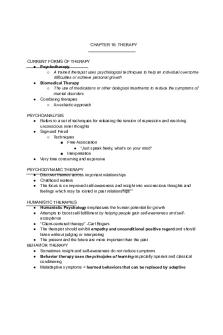Psych Notes 10/10 & 10/12 PDF

| Title | Psych Notes 10/10 & 10/12 |
|---|---|
| Author | Angelic Shelton |
| Course | Introduction To Psychology |
| Institution | University of Arizona |
| Pages | 2 |
| File Size | 45.8 KB |
| File Type | |
| Total Downloads | 98 |
| Total Views | 147 |
Summary
Download Psych Notes 10/10 & 10/12 PDF
Description
Effortful Processing Strategies: ● Chunking: organizing data into manageable units. ● Chunking: works even better if we can assemble information into meaningful groups. ● Pizza, Plane, Pencil, Cigar, Candy, Fire ● We encode better with the help of images. ● A mnemonic is a memory “trick” that connects information to existing memory strengths. ● We are more likely to recall a concept if we encode it in a hierarchy, a branching/nested set of categories and sub-categories. ● The self-reference effect: relating materials to ourselves, aids encoding and retention. Implicit Memory Processing: ● The cerebellum (“little brain”)forms and stores our conditioned responses. ● The basal ganglia: next to the thalamus, controls movement, and forms and stores procedual. Emotions and Memory: ● Strong emotions, especially stress, can strengthen memory formation. ● Flashbulb memories: refer to emotionally intense events that become “burned in” as a vivid-seeming memory. Synaptic Memory: ● Synapses: the junctions between neurons. ● Long-term potentiation: signals are sent across the synapse more efficiently. Retrieval Cues: ● Retrieval challenge: memory is not stored as a file that can be retrieved. ● Part of the web of associations of a memory is the context. ● We retrieve a memory more easily when in the same context as when we formed the memory. State-Dependent Memory: ● Our memories are not just linked to the external context in which we learned them. ● Memories can also be tied to the emotional state we were in when we formed the memory. ● Mood-congruent memory refers to the tendency to selectively recall details that are consistent with one’s mood.
The Serial Position Effect: ● Priming and context cues are not the only factors which make memory retrieval selective. ● The serial position effect refers to the tendency, when learning information in a long list, to more likely recall the first items (primary effect) and the last items (recency effect) Forgetting is not always a bad thing: ● If we remembered everything, maybe we could not prioritize the important memories. The brain and the two-track mind: The case of Henry Molaison: ● In 1953 the removal of H.M’s hippocampus at age 27 ended his seizures, but also ended his ability to form new explicit....
Similar Free PDFs

Psych 1010 notes-Senses
- 3 Pages

Psych 1010 notes-Behavior
- 2 Pages

PSYCH 1010 - Module 15, questions
- 30 Pages
Popular Institutions
- Tinajero National High School - Annex
- Politeknik Caltex Riau
- Yokohama City University
- SGT University
- University of Al-Qadisiyah
- Divine Word College of Vigan
- Techniek College Rotterdam
- Universidade de Santiago
- Universiti Teknologi MARA Cawangan Johor Kampus Pasir Gudang
- Poltekkes Kemenkes Yogyakarta
- Baguio City National High School
- Colegio san marcos
- preparatoria uno
- Centro de Bachillerato Tecnológico Industrial y de Servicios No. 107
- Dalian Maritime University
- Quang Trung Secondary School
- Colegio Tecnológico en Informática
- Corporación Regional de Educación Superior
- Grupo CEDVA
- Dar Al Uloom University
- Centro de Estudios Preuniversitarios de la Universidad Nacional de Ingeniería
- 上智大学
- Aakash International School, Nuna Majara
- San Felipe Neri Catholic School
- Kang Chiao International School - New Taipei City
- Misamis Occidental National High School
- Institución Educativa Escuela Normal Juan Ladrilleros
- Kolehiyo ng Pantukan
- Batanes State College
- Instituto Continental
- Sekolah Menengah Kejuruan Kesehatan Kaltara (Tarakan)
- Colegio de La Inmaculada Concepcion - Cebu












